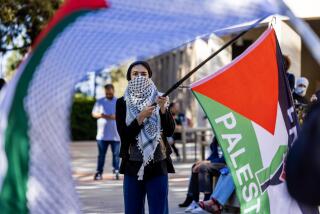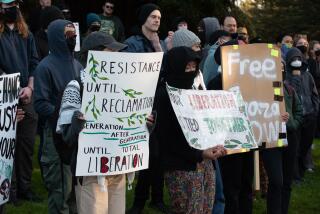Pierce’s Rodeo Opens Amid Protest : Demonstration: Activists call college’s event cruel to animals. School official says group doesn’t have facts straight.
- Share via
WOODLAND HILLS — Animal rights activists picketed the opening of Pierce College’s annual rodeo Friday night, saying the event is cruel to the animals.
Some 15 protesters turned out at the school’s Winnetka Avenue entrance, carrying signs with slogans such as “Stop Tormenting Animals for Entertainment,” and urging spectators to stay away from the three-day event.
“We’re here to raise public awareness about the reality of rodeo,” said Simon Oswitch, president of Santa Monica-based Animal Emancipation Inc. “It’s a very violent, abusive spectacle.”
Picketing has occurred for several years at the 38-year-old rodeo, which benefits the school’s animal science program. The protesters--some from a West Hollywood group called Last Chance For Animals--said they will pass out leaflets today and Sunday.
Ron Wechsler, the school’s animal science professor, said the group doesn’t have its facts straight. “These are emotional outcries from people trying to get money for their organization,” said Wechsler, who is also the school’s rodeo adviser.
Animal Emancipation said in a statement that the animals are “subjected to a variety of torments, including electric shock, constricting of their abdomens and genitals with leather straps, tail-twisting (and) tripping.” During calf-roping events, the group claims, “infant animals are forced to run to speeds of up to 30 miles per hour and then have their necks violently snapped back via taut ropes.”
Wechsler said tripping animals and twisting their tails is prohibited under rules established by the Professional Rodeo Cowboys Assn. And animals’ abdomens and genitals are not constricted with leather straps to make them buck. The animals, he said, are bred to buck naturally.
A special rope is used in the calf roping events, he said. After the animal is lassoed, it breaks into two pieces to prevent the animal from being jerked back.
He admitted rodeo hands use cattle prods to move animals around. “It’s used as little as possible,” he said. “The animals have thicker skin so the only other way to move these animals around is to take some other device to hit them with, which would be traumatic and cruel.”
An investigator for the Los Angeles Society for the Prevention of Cruelty to Animals, Capt. Dave Havard, said he is not aware of any complaints against the school.
He said his agency, which often sends plainclothes officers to rodeos, has gone to Pierce College rodeos twice in the past few years and has never seen any iolations of animal protection laws.
Madeline Bernstein, executive director of the agency, said the organization opposes rodeos in general. “Even at this point, even if everyone obeyed the letter of the law as it exists, the fact that it’s legal today still doesn’t make it a humane thing to do,” she said.
Wechsler said statistics compiled by the Rodeo Cowboys Assn. show that few animals are injured in the events. For example, he said, one study revealed that out of 1,546 calf-roping runs analyzed, there were only 12 injuries.
More to Read
Sign up for Essential California
The most important California stories and recommendations in your inbox every morning.
You may occasionally receive promotional content from the Los Angeles Times.













